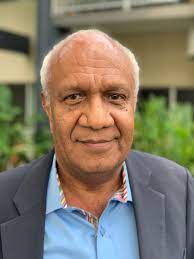Vanuatu’s opposition party boycotted parliament on Thursday and said it would lodge a court challenge to the defeat the previous day of its bid to remove Prime Minister Ishmael Kalsakau.
Kalsakau narrowly survived a no-confidence motion on Wednesday, with the opposition falling one vote short of the 27 needed to unseat him after criticising his government for signing a security pact with Australia.
Vanuatu, at the centre of a strategic rivalry between China and Western countries in the Pacific, was plunged into political crisis after opposition leader Bob Loughman lodged the no-confidence petition, which also criticised the government for raising the minimum wage.
Loughman drew Vanuatu closer to China as the previous prime minister, before losing a snap election in 2022.
He said in parliament on Wednesday the country’s “impartiality” had been compromised by the Australian security deal and infrastructure development could be at risk, comments taken to refer to China, which has been a major infrastructure lender, donating a parliament building, stadiums and the prime minister’s office, as well as building roads and wharves.
Vanuatu should not be “sucked into a game it does not want, to be used inappropriately by competing nations to exert dominance in our region”, he said.
The United States and its allies are seeking to deter Pacific Islands countries from establishing security ties with China after it signed a security pact with the Solomon Islands.
Kalsakau said Australia had increased its aid, and a record number of world leaders had visited, in the eight months since he was elected.
Wednesday’s no-confidence motion won 26 votes, compared with 23 votes against, but failed to win the absolute majority of 27 needed to remove a prime minister in the 52-seat parliament.
One seat is vacant and one lawmaker did not attend the session due to illness.
Loughman told a press conference on Thursday the government of Vanuatu had “fallen down” and the court should decide the matter.
Opposition lawmakers boycotted parliament on Thursday and the speaker adjourned the session, saying the chamber could not sit with only 25 members.
Kalsakau told broadcaster VBTC the constitution required an absolute majority to change prime minister.
SOURCE: WIRES/AGENCIES/PACNEWS













